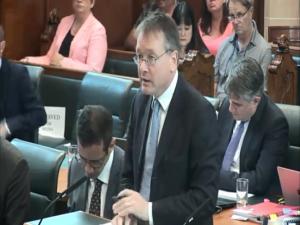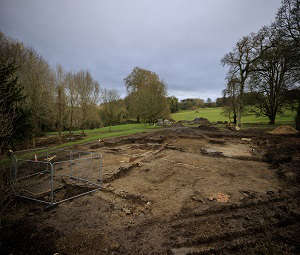
By Michael McHugh, PA
The Attorney General for Northern Ireland is expected to be appointed a temporary High Court judge.
John Larkin QC has been chief legal adviser to the Stormont Executive since 2010.
The former barrister's elevation to the bench is intended to help ease work pressure on the judiciary and is in addition to his current role.
He declined to confirm the appointment during a meeting of Stormont's Justice Committee on Thursday but addressed the issue of judicial conflict of interest more hypothetically.
Mr Larkin said: "There is a fairly rich body of law on the appearance of bias and on actual bias and all the judges and indeed all lawyers are well aware of the content of that law."
If a temporary judge had represented a client during his work as a lawyer and the matter was central to an issue to come before him he would not sit as judge in that case, Mr Larkin said.
He added cases were allocated only if it was felt the judges were able to hear them.
Mr Larkin said temporary posts were frequently used in England and Wales, albeit in a larger jurisdiction.
"I think, for what it is worth, the Lord Chief Justice is to be commended for undertaking this experiment."
He said much of what governments did was experimental.
"Sometimes the very best experiments are not those that work.
"The very best experiments are the types that sometimes don't work so well and it is from those that you learn most from.
"Any temporary or full-time judge is aware of a firm body of existing case law on issues such as conflict, apparent or actual bias, and would be expected to comport him or herself accordingly."
Justice Committee chairman Paul Givan asked how a barrister would manage a role as a High Court judge one day then make representations to colleagues in a different capacity the next day.
The attorney general said: "I agree and it will not be without its interest in terms of how those issues are managed."
He said temporary judges were suggested in Dublin but thought not to be feasible.
Six senior barristers were appointed to the role earlier this month.
These are fee-paid and not salaried posts.
The recruitment was driven by the need to be able to ensure sufficient judicial resources in the High Court and to avoid impact on access to justice.
Pressures on the High Court arise from two vacant posts and additional demands resulting from the appointment of a High Court judge as President of the Historical Institutional Abuse Redress Board and the allocation of High Court judges to hear legacy inquests.


 13 year boy dies following quad bike crash near Newry
13 year boy dies following quad bike crash near Newry
 Man appears in court charged over head-on collision which killed father and son
Man appears in court charged over head-on collision which killed father and son
 Remains of 300-year-old building complex unearthed by chance on country estate
Remains of 300-year-old building complex unearthed by chance on country estate
 Fresh Met Office warning for icy conditions across Northern Ireland
Fresh Met Office warning for icy conditions across Northern Ireland
 Community still in shock over deaths of father and son, funeral told
Community still in shock over deaths of father and son, funeral told